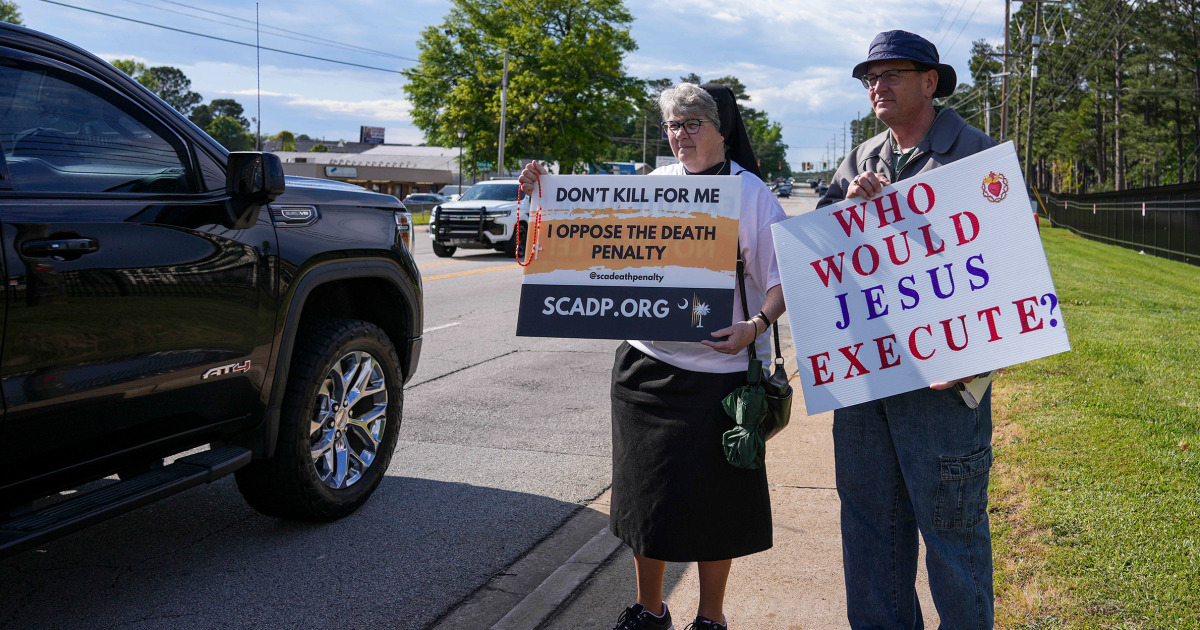Execution by Firing Squad: South Carolina Executes Man Who Killed Police Officer

COLUMBIA, S.C. In a significant and chilling event, a firing squad executed Mikal Mahdi on Friday, following his conviction for the murder of an off-duty police officer. This execution marks the second time in just five weeks that South Carolina has employed this rare method, drawing attention to the controversial practice.
When the curtain was drawn, Mahdi, 42, displayed no final words nor did he acknowledge the nine witnesses who observed the execution from behind bulletproof glass. As the shots rang out, he cried out in pain; witnesses reported that his arms flexed involuntarily. A stark white target, marked with a red bulls-eye, was placed over Mahdis chest wound. Approximately 45 seconds post-execution, Mahdi was heard groaning again, with his breathing persisting for about 80 seconds. Ultimately, he appeared to take one last, labored gasp before a doctor pronounced him dead at 6:05 p.m., a mere four minutes after the bullets were fired.
Choosing the firing squad over lethal injection or the electric chair, Mahdi's decision reflects a growing trend in South Carolina, where lawmakers have deemed this method as the swiftest and most humane option for capital punishment. This is particularly relevant given the challenges faced in obtaining lethal injection drugs, a situation that has complicated executions nationwide. The three individuals who fired the bullets that ended Mahdi's life were volunteers, demonstrating the complexities of ethical participation in capital punishment.
Mahdi's execution is notable as it represents the fifth execution in South Carolina within the last eight months. This development comes after a prolonged pause of 13 years without executions in the state, as South Carolina works through the backlog of inmates whose appeals have been exhausted. This year alone, Mahdis execution marks the 12th capital punishment carried out in the United States, with the country witnessing 25 executions across nine states in total for 2024. Other states, including Alabama and Louisiana, have utilized nitrogen gas, while lethal injection remains standard in Florida, Oklahoma, Arizona, and Texas.
Prior to his execution, Mahdi enjoyed a final meal that consisted of ribeye steak cooked medium, mushroom risotto, broccoli, collard greens, cheesecake, and sweet tea, as confirmed by prison officials. This last meal is a common tradition that allows condemned inmates a final indulgence.
The Crime: In a harrowing account of his past, Mahdi confessed to the murder of Orangeburg Public Safety officer James Myers in 2004. He shot the officer at least eight times before committing the heinous act of burning Myers' body. Tragically, Myers wife discovered his remains in their Calhoun County shed, a location that held sentimental value as it was where they had been married just months prior.
On the day of the murder, Mahdi was attempting to use a stolen credit card to purchase gas at a nearby station, leaving behind a vehicle he had carjacked in Columbia. His apprehension occurred in Florida after he was found driving Myers unmarked police pickup truck. Additionally, Mahdi admitted to killing Christopher Boggs, a clerk at a convenience store in Winston-Salem, North Carolina, just three days before he shot Myers. For that earlier crime, Mahdi received a life sentence.
Final Appeals: Mahdi's final appeal was denied by both the U.S. Supreme Court and the South Carolina Supreme Court just days before his execution. His defense team criticized the original attorneys for a lackluster case that failed to present a comprehensive picture of Mahdis life and background, neglecting to call witnesses that could have painted a more sympathetic narrative. The defenses attempt to save Mahdis life lasted a mere 30 minutes, described by his lawyers as superficial, not even as long as the average episode of a crime drama.
Mahdis early childhood was characterized by trauma, including witnessing his fathers violent outbursts. His father removed him from school when he was in the fifth grade after officials indicated he required behavioral intervention. Prosecutors painted a portrait of Mahdi as an individual who resorted to violence to solve his problems, citing instances of aggressive behavior even while on death row, including attacking prison staff and attempting to escape.
David Weiss, Mahdis attorney, remarked on the broader implications of his clients execution, condemning it as a stark reminder of a judicial system that failed Mahdi repeatedly throughout his life. Weiss characterized the execution as a horrifying act belonging to the darkest chapters of history rather than a practice suited for a civilized society.
A Busy Death Chamber: The execution of Mikal Mahdi comes at a time of increased activity within South Carolina's death chamber, marking the fifth execution since September a stark contrast to the 11-year hiatus on executions that preceded this period. Currently, there are 28 inmates on South Carolinas death row, with no additional inmates left with appeals, although several are nearing the end of their legal options.
The state managed to resume executions after lawmakers sanctioned the use of firing squads and enacted legislation to protect suppliers of pentobarbital, along with the protocols for executions, creating a level of secrecy around the processes involved. Alongside Mahdis execution, three other inmates have been executed via lethal injection since September, highlighting a renewed commitment to capital punishment in South Carolina.



























